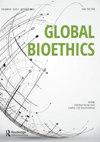The biopsychosocial model of human unsustainability: a move toward consilience
Q1 Arts and Humanities
引用次数: 3
Abstract
This article introduces one type of comprehensive complex systems model to explain why humanity continues to be frustrated by its lack of progress toward sustainability. Human overconsumption has now raised concern over the depletion of resources and environmental decay to critical levels that threaten the integrity of the human species, the planet's biodiversity and the global ecosystem in general. The focus on biopsychosocial explanations of human unsustainability is framed to encourage an interdisciplinary approach to problem solving towards a global bioethics. This framework relies on three essential elements: the first concerns the notion that human overconsumption behavior is principally driven by an unconscious set of evolutionary (biological) predispositions to survive and prosper; the second element focuses on our unique psychological make-up, which at its core is universal and naturally selected over a geologic period that spans at least the 200–250 million-year natural history of mammals; the third component of the biopsychosocial model is the human evolutionary predisposition to seek out and participate in social behavior. This third element is selected because of the reciprocal benefits of cooperating with others for the purpose of enhancing everyone's survival. These three components have an evolved interrelationship and interdependence from which the full complement of human behavior emerges. Moreover, these three factors constitute the root causes of human overconsumption behavior and the basis for our unsustainable nature. This article argues that the biopsychosocial explanation of human unsustainability can adequately characterize virtually any kind of human and social phenomena that involve the exploitation of resources. Examples, such as the origins and effects of media and advertising, politics, education and religion on overconsumption, are discussed. The final section attempts to demonstrate that a comprehensive approach that unifies biological, psychological and social parameters toward solving the human unsustainability problem can be achieved.人类不可持续性的生物-心理-社会模型:走向一致性
本文介绍了一种综合复杂系统模型来解释为什么人类一直因缺乏可持续发展而感到沮丧。人类的过度消费现在已经引起了人们对资源枯竭和环境恶化的担忧,这威胁到人类物种的完整性、地球的生物多样性和全球生态系统。对人类不可持续性的生物心理社会解释的重点是鼓励跨学科的方法来解决问题,以实现全球生物伦理学。这个框架依赖于三个基本要素:第一个是人类过度消费行为主要是由一组无意识的进化(生物)倾向驱动的,以生存和繁荣;第二个要素侧重于我们独特的心理构成,其核心是普遍的,是在至少跨越2 - 2.5亿年哺乳动物自然历史的地质时期自然选择的;生物心理社会模型的第三个组成部分是人类寻求和参与社会行为的进化倾向。选择这第三个要素是因为与他人合作的互惠利益,目的是提高每个人的生存。这三个组成部分有一种进化的相互关系和相互依赖,从中产生了人类行为的完整补充。此外,这三个因素构成了人类过度消费行为的根源,也是我们不可持续的基础。本文认为,人类不可持续性的生物心理社会解释可以充分表征几乎任何一种涉及资源开发的人类和社会现象。例子,如媒体和广告,政治,教育和宗教对过度消费的起源和影响进行了讨论。最后一节试图证明,一个综合的方法,统一的生物,心理和社会参数来解决人类的不可持续性问题是可以实现的。
本文章由计算机程序翻译,如有差异,请以英文原文为准。
求助全文
约1分钟内获得全文
求助全文

 求助内容:
求助内容: 应助结果提醒方式:
应助结果提醒方式:


